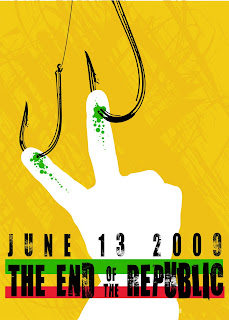
I have been intensely interested in the Iranian protests this past weekend. While I cannot know the truth about the election, such an uprising suggests that while President Ahmadinejad still has strong support, it cannot be as strong as the official numbers purported. What is amazing to me, having lived through the U.S.A.'s 2000 election, is how much votes matter to people. Here are millions of people rising up and demanding their votes be counted; when 5 Supreme Court justices decided an election here, all we did was grumble. Ahmadinejad has compared the protesters to angry soccer fans and to dirt on the street. Well, it would seem these protesters are taking their vote a little bit more seriously than a soccer match (not to belittle soccer), but they are now risking their lives to have their votes counted, and I doubt millions of people would do so, for several days, after a bad referee's call at a soccer game. I think the problem is that people in the U.S. treat our politics like they are nothing more than football games, like they don't really matter that much. We could all learn a lesson from Iranians this time around; sometimes politics do matter.
Of perhaps even greater interest to me, though, is the way that Iran shows itself to share some of the significant statistical divides one sees in the U.S., that the more urban and the better educated tend to support Mousavi in Iran, just as the more urban and better educated tend to support the Democrats here. I do not mean to ove simplify the issues at stake in Iran (or the ones in the U.S. too; there is crossover and division within each conglomeration, even here); they are a complex society, with an even more complex political system that is not directly parallel to ours. But I am fascinated and disturbed, given the recent dramatic increase in gun and ammunition sales in the U.S., that we are staring down the mouth of our own potential civil war, one between urban and rural cultures (more people now live in cities than in the country now, globally, which is a dramatic cultural shift in the history of human civilization) and that Iran may be facing such an internal struggle right now too.
One other note of concern I need to sound though, despite my simplistic comparison there, is that we need to think complexly. Roger Cohen of the New York Times has done such a striking job with that. Disappointingly, most of the comments on Cohen's editorial, "Iran's Day of Anguish," missed his complexity entirely. Many of the people seemed incapable of perceiving that members of the Iranian establishment, which Mousavi was a definite member of, are divided among themselves, that the brutality is one wing of an establishment against another. That what is going on is enormously complex, that Iranians are complex and reflect a range of opinions on the world, on life, on the best course for their own future. To some extent I also think a global culture war now exists between those capable of seeing shades of gray and those who see things in black and white (not to cast the world into too many camps of two; I think we all exist in several competing camps at the same time, but at certain nexus points in history some views seem to predominate and divide us; we may be approaching such a moment).
Another excellent piece was posted today on The Public Sphere. Mohammad Razi points to both the promise and the potentially horrific failures of revolution.
Finally, I need to express my shock at discovering that Twitter is not just a self-indulgent narcissistic personality disorder self-publicity invention. It has actually played a critical role in the Iranian protests this weekend. Apparently the revolution will not be televised, but it might be tweeted.
--
Image from an Iranian American graphic designer, popularly circulating around the web right now.